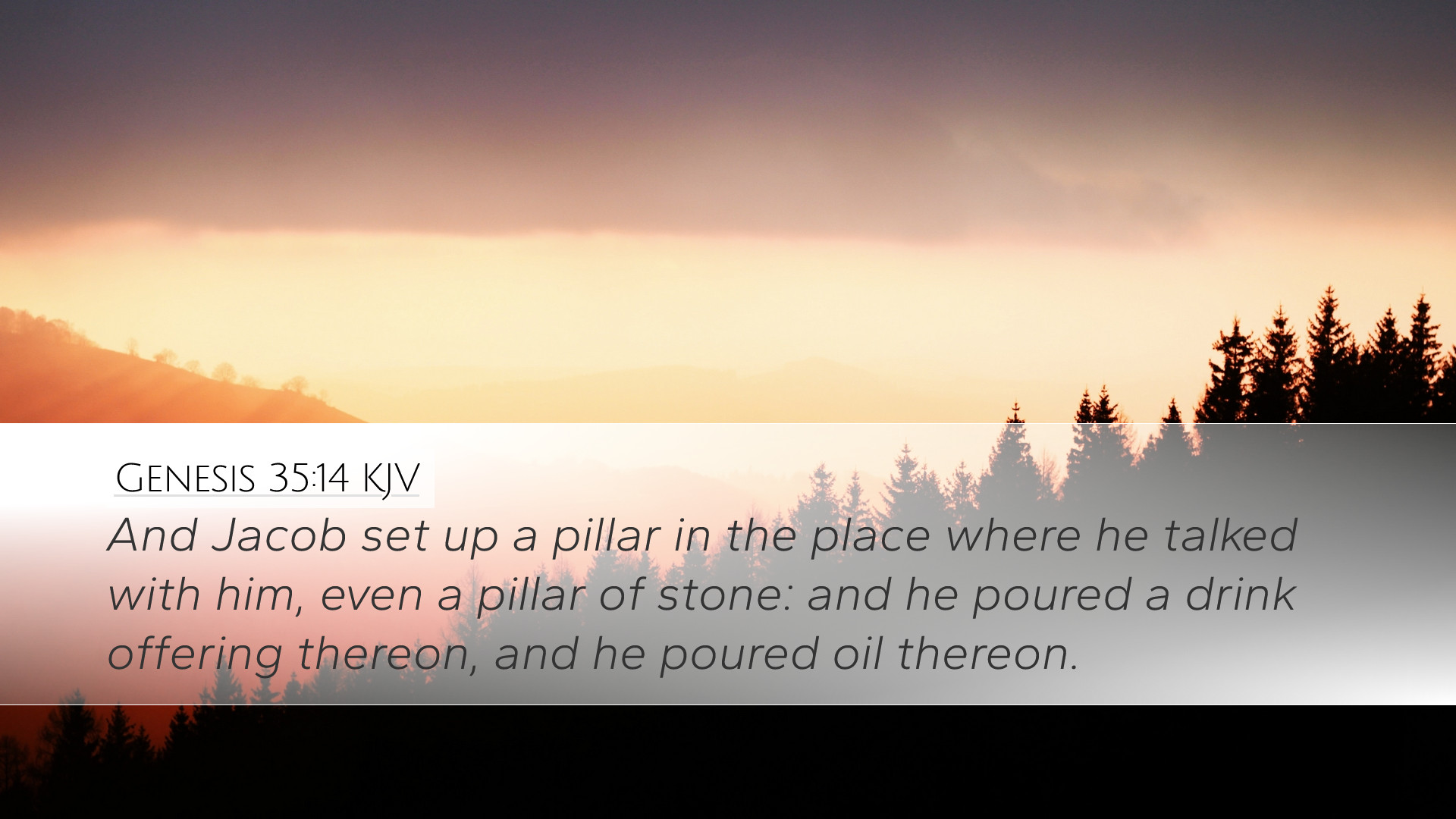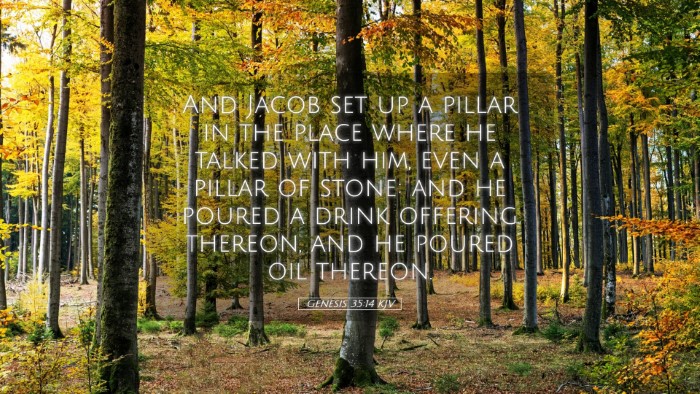Commentary on Genesis 35:14
Text of Genesis 35:14 (KJV): "And Jacob set up a pillar in the place where he talked with him, even a pillar of stone: and he poured a drink offering thereon, and he poured oil thereon."
Introduction
The passage in Genesis 35:14 marks a significant moment in Jacob's life as he rededicates himself and his family to God after a profound encounter. The act of setting up a pillar and the accompanying offerings reflect Jacob’s response to God’s revelations and blessings. This commentary seeks to unpack the theological and historical significance of these actions through the insights of respected public domain commentators.
The Setting of the Pillar
Matthew Henry's Insights: Matthew Henry emphasizes the symbolic significance of the stone pillar Jacob erected. In the ancient Near Eastern context, setting up a pillar was a common practice to commemorate divine encounters. Henry notes that Jacob's act is not just a memorial but a public acknowledgment of God's presence and covenant with him. This is further illustrated by Jacob's previous encounters with God at Bethel, affirming that these pillars served as reminders of God's fidelity and promises.
Albert Barnes's Observations: Barnes highlights the idea of the pillar being a testimony to the transaction between God and Jacob. It anchors the narrative in the broader theme of God making covenants with patriarchs. The physicality of the stone symbolizes both strength and permanence, representing God’s eternal promises. It serves as a tangible reminder of the spiritual significance of what transpired in that sacred space.
The Drink Offering
Adam Clarke's Commentary: Clarke provides insights into the drink offering that Jacob poured. This act, along with the oil, signifies dedication and sanctification of the space Jacob encounters God. Clarke explains that drink offerings were common in Hebrew worship as an expression of gratitude and devotion. Through this act, Jacob is recognizing God’s blessings and expressing his allegiance. The importance of liquid offerings, particularly wine representing joy and celebration, indicates that Jacob was not just fulfilling a duty but also participating in a relationship with God filled with reverence and praise.
Matthew Henry on Offerings: Correspondingly, Henry elucidates that the pouring of the drink offering suggests an acknowledgment of God's sovereignty and grace. The offering is an expression of Jacob's gratitude for God's guidance and providence, especially after the turmoil surrounding his family's past, including the incidents in Shechem. Henry argues that this moment captures the transition of Jacob’s life from a fugitive to a patriarch who deliberately worships God.
The Role of Oil
Historical Context: The use of oil in biblical rituals often symbolizes anointing, blessing, and the presence of the Holy Spirit. This ceremonial use indicates that Jacob recognizes the holiness of the space and is consecrating it as a sanctuary for God’s presence.
Albert Barnes's Reflection: Barnes elaborates on the significance of oil being poured on the pillar. It signifies the importance of using plentiful resources when dedicating to God. The anointing with oil can also herald God's favor and blessing upon his future endeavors, portraying Jacob's reliance on God's continued guidance.
Theological Implications
This passage brings forth several theological themes that resonate through Scripture.
- Covenantal Relationships: Jacob's pillar symbolizes the enduring nature of God’s covenants, which are foundational to biblical theology.
- Act of Worship: Setting up the pillar and the offerings reflect a deeply personal and communal act of worship, illustrating the importance of physical expressions in adorning our spiritual commitments.
- Prayer and Reflection: This encounter highlights the need for believers to pause, reflect, and thank God for His guidance, embodying the essence of worship in both private and collective settings.
Conclusion
Genesis 35:14 serves as a rich tapestry of Jacob’s journey with God, encapsulating themes of remembrance, worship, and covenant. The actions of setting up a stone and making ritual offerings embody Jacob's transformation and dedication to God's service. As pastors, students, and scholars reflect on this verse, they are called to consider their own acts of worship and the physical and spiritual markers they establish in their spiritual journeys.


